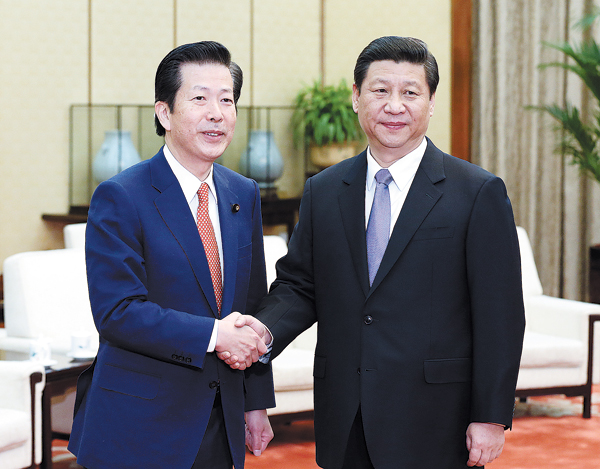Call to solve 'sensitive issues'
Updated: 2013-01-26 03:46
By Zhang Yunbi (China Daily)
|
||||||||
|
 Top leader Xi Jinping greets Natsuo Yamaguchi, party leader of Japan’s New Komeito, in Beijing on Friday, in a meeting that analysts said could help ease tensions over the Diaoyu Islands. [Wu Zhiyi / China Daily] |
Top leader Xi Jinping called for the resolution of sensitive issues haunting China-Japan ties as a Japanese envoy handed him a letter from the prime minister on Friday.
The meeting between Xi and Natsuo Yamaguchi, party leader of Japan's pacifist New Komeito, has been the highest-level contact between the two countries since tensions over the Diaoyu Islands spiked in September.
Observers said the two largest Asian economies have felt the pain brought by the territorial dispute.
Yamaguchi started a four-day visit to China on Tuesday.
Xi hailed Yamaguchi's visit when ties are faced with a "special situation", and he said Beijing's emphasis on the development of the China-Japan relationship "has not changed".
New Komeito is a junior partner in the ruling coalition with Prime Minister Shinzo Abe's conservative Liberal Democratic Party.
Abe said in the letter that Japan-China ties are one of Japan's most important relationships, and he vowed to act in consideration of the big picture and to boost the strategic and mutually beneficial relationship.
Zhou Yongsheng, an expert on Japanese studies at China Foreign Affairs University, said the Diaoyu Islands dispute cannot be solved overnight and Yamaguchi's trip serves as an impetus for expanding channels of high-level dialogue between the neighbors.
Diplomatic communication is ongoing between Beijing and Tokyo aimed at avoiding a major conflict regarding the islands, said Shen Shishun, an expert on Asia-Pacific studies at Haikou College of Economics.
"Given the current situation, it is both sides' top priority to avoid miscalculation and emergencies," Shen said.
Trade and diplomacy have been affected, and many Chinese took to the street after the Japanese government in September illegally "purchased" part of the Diaoyu Islands, which belong to China since ancient times.
Japan should respect the Chinese people's national feelings and correctly handle historical issues, Xi said.
But Yang Bojiang, a Japanese studies expert at the Chinese Academy of Social Sciences, said China-Japan ties are very complex.
Japanese air force planes have in recent weeks been scrambled frequently against Chinese patrol planes approaching airspace over the islands, a move that has ramped up tensions.
A fishing vessel with a group of activists from Taiwan was obstructed from landing on Thursday by Japanese coast guard ships in the waters surrounding the islands.
Zhou from China Foreign Affairs University said China should prepare on two fronts. "Beijing should take firm countermeasures against Japan's unilateral provocation and, at the same time, work to drag bilateral relationships out of the deadlock."
The row between the world's second- and third-largest economies has seen Japanese manufacturers report considerably lower sales in China.
Japan's market share in China and Southeast Asian countries plays a determining role in whether the country can work its way out of the economic downturn, said Shen from Haikou College of Economics.
Abe returned to power in a landslide victory last month, and he had vowed to take a tough stance against China during his election campaign.
However, the reality of political office will soon set in and Abe may ease the hardline stance he took while campaigning, Toshiba Corp Chairman Atsutoshi Nishida told Reuters in Davos.
A friendship group, led by former Japanese prime minister Tomiichi Murayama, will visit China next week.
Reuters and AP contributed to this story.
Contact the writer at zhangyunbi@chinadaily.com.cn

 Li Na on Time cover, makes influential 100 list
Li Na on Time cover, makes influential 100 list
 FBI releases photos of 2 Boston bombings suspects
FBI releases photos of 2 Boston bombings suspects
 World's wackiest hairstyles
World's wackiest hairstyles
 Sandstorms strike Northwest China
Sandstorms strike Northwest China
 Never-seen photos of Madonna on display
Never-seen photos of Madonna on display
 H7N9 outbreak linked to waterfowl migration
H7N9 outbreak linked to waterfowl migration
 Dozens feared dead in Texas plant blast
Dozens feared dead in Texas plant blast
 Venezuelan court rules out manual votes counting
Venezuelan court rules out manual votes counting
Most Viewed
Editor's Picks

|

|

|

|

|

|
Today's Top News
Boston bombing suspect reported cornered on boat
7.0-magnitude quake hits Sichuan
Cross-talk artist helps to spread the word
'Green' awareness levels drop in Beijing
Palace Museum spruces up
First couple on Time's list of most influential
H7N9 flu transmission studied
Trading channels 'need to broaden'
US Weekly

|

|








